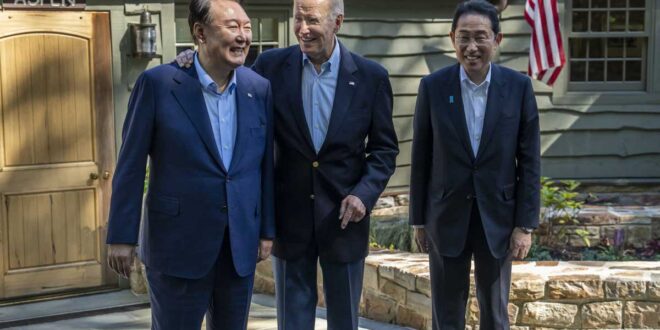Historically, “The Spirit of Camp David” has been acclaimed widely since it witnessed the peace deal between the United States and the former Soviet Union in 1959 during the heyday of the Cold War, and also the peace treaty between Israel and Egypt under the U.S. mediation in 1978 when the treaty was formally signed at Camp David. On August 18, 2023, however, it is hard to define it in line with the spirit of pace when a joint statement was issued by Japan, Korea (ROK) and the United States as the summit was held at the Camp David.
For sure, Japan, ROK and the U.S. have legitimate rights to cherish their security and core interests, no matter if they claimed the Spirit of Camp David. Yet, in a thorough reading of the joint statement, it is not difficult to parse the hidden intention of the triples to prepare a “decisive” war against DPRK (North Korea) in name of peace and stability in the region. As a matter of fact, North Korea is much weaker and smaller than the triple allies in terms of respective territory, population and natural resources, not to mention overall national wealth, military strength, high-technology development and global allies.
In addition, Japan, South Korea and the U.S. declared the summit at the Camp David a new era of trilateral partnership since the world of the day requires unity and coordinated action from the valued-shared countries. Accordingly, they pretentiously act three musketeers of the new century with a view to advancing peace, prosperity as well as human rights in the region and the world. Yet, the reality is that the triple allies are not only much industrialized than its north rival, but also have stockpiled huge amount of all sorts of the most advanced weapons in the East Asia and on the Korean peninsula. Since they claim it necessary to deter North Korean nuclear attack, the U.S.-Japan-ROK have conducted routine military drills each year in line with the dangerous doctrines of massive retaliation and strategic deterrence, which were originally designed against former the Soviet Union, which was however a much powerful and advanced rival to the United States and its allies during the Cold War.
The triple allies denounced North Korea to develop multiple intercontinental ballistic missile program in name of relevant UNSC resolutions. Yet, they seem to have never thought of their multiple aggressive military drills and so advanced weapon systems posing the immediate threats to the legitimate rights and core interests of North Korea. Furthermore, the triple powers have never taken care of the basic survival needs of North Korea, while talking about the hollow principles of the human rights and unilateral peace plan. Thus, it is geopolitically evident that the U.S. and its key allies in Asia have aimed at the pacing rivals such as China and Russia which have been the de facto strategic partners of North Korea.
Historically, the ruling powers and their allies have always aimed to contain the rising powers even though they presented any legitimate claims and concerns with their core interests. Today the United States and its global allies and partners are no exception, but meanwhile they have made all efforts to cover their unilateral hegemonic world order. For example, the U.S. and its two junior allies—Japan and South Korea—have vowed to defend their shared values while guiding a free and open Indo-Pacific and beyond in name of serving the core interests of their half-billion people’s welfares and collective prosperity. It is more ridiculous that three powers claim bolstering regional and global peace and security in line with the rule of law, while they have openly violated the fundamental tenets of collective security and indivisible security of sovereign state. For example, the United States is not only the most powerful country but also has recast global allied system. Washington has never accepted the peer in a geopolitical term as it sees Russia as a direct threat and China as a systemic rival now or later. To that end, the U.S. has taken bilateral allies with Japan, triple pact with both Japan and South Korea, while forging strategic nuclear AUKUS, Quad security platform in the Indo-pacific and the Five-eye Anglo-Saxon axis globally.
To contain the rise of China, the triple allies claimed to reaffirm ASEAN centrality and to support the ASEAN-led regional architecture. Actually, it is China that has been the largest trade partner rather than others. Yet, China has never claimed to be the protector of the ASEAN countries and never stirred the peace in the region. On the issue of the Mekong river basin, China has kept the close consultation with other countries along the Mekong River. In fact, six countries including Vietnam have been benefitted from their cooperation in accordance with the Lancang-Mekong Conduct Code since China has shared annual hydrological information with its partners starting from 2020 aiming to better utilize water resources while addressing climate change and the natural disasters involved. However, China has and will continue rejecting any external force or threat of using force to harm China’s core interests and security concerns.
As the solo ruling power, the United States along with its global allies has always distorted their competitors and rivals, now referring to Russia, China, Iran and North Korea. At the summit of Camp David, the triple powers lost no time to demonize Russia and its aggressive war against Ukraine, which is a sovereign state recognized by the United Nations. Following the U.S. directive, Japan and South Korea reiterated their support for Ukraine and against Russia’s brutal war of aggression that has shaken the foundation of the U.S. hegemonic order. Yet, this piece opines that in a long run, it is unwise for Japan and S. Korea “to continue providing assistance to Ukraine, imposing coordinated, robust sanctions on Russia, and accelerating the reduction of dependency on Russian energy.” It is necessary to be aware that a long peace in Europe and the world requires a rational acceptance of Russia as a great power in the global equilibrium. It is also true that the principles of territorial integrity, sovereignty, and the peaceful resolution of disputes must be fully observed and respected.
In sum, China has criticized the triple summit at Camp David, while reiterating that no country should seek its own security at the expense of other countries’ security interests as well as regional peace and stability. In a world of change and disorder on the security front, the Asia-Pacific is an anchor for peace and development and a promising land for cooperation and growth. Thus, it has never be turned into a wrestling ground for geopolitical competition and the new arena of the bloc confrontation as it contradicts the principle of indivisible security.
 Geostrategic Media Political Commentary, Analysis, Security, Defense
Geostrategic Media Political Commentary, Analysis, Security, Defense





